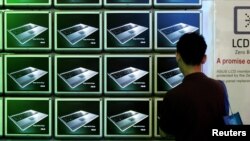In Taiwan, people eager to escape poverty in the 1960's started many of today’s top companies, building a half-trillion-dollar economy along with a well-off society. Elders, however, are urging the next generation to stay safe by avoiding risk, a threat to the aggressive innovation that officials say Taiwan needs to remain competitive.
In mid-October, Taiwan’s No. 2 negotiator to China warned that Taiwanese lacked aggressiveness and an enterprising spirit. He cautioned against being a “sheep” in the face of fast-growing China, Taiwan’s political and military rival of 65 years. The seldom heard social critique by a public official points to growing awareness in Taiwan that today’s youth prefer safe jobs to the risky business ventures of their elders and modern mainland Chinese.
The preference for safe jobs threatens innovation and new business startups, which officials say are crucial for Taiwan’s future as an exporter of goods from plastics to consumer electronics.
Yang Lian-fu, a publisher of books on Taiwanese history, said parents in Taiwan steer their adult children to look for safe jobs and schools and provide little inspiration.
He said young Taiwanese people care most about the quality of life. He added that this preference is related to the nation’s history and that modern parents want their children to lead a safe life after their education is complete. Yang called Taiwan’s education system peaceful, saying that as long as students study hard, there is not too much pressure.
When Taiwan was poor, dependent on farming and fishing until industrial development in the 1960s, people with business acumen would get ahead by founding companies. The trend gave rise to companies such as Evergreen Marine, the world’s No. 4 container shipper, and Wang Yung-ching, billionaire founder of the petrochemical giant Formosa Plastics Group.
Elders now hope their children can avoid poverty as well as the risks of starting a business, but officials want Taiwanese to keep inventing and investing so the island remains competitive against fast-changing, export-reliant areas such as China, South Korea and Southeast Asia.
Younger people in China are pushed harder by parents and schools to compete, adding to the world No. 2 economy. Tony Phoo, a Standard Chartered economist in Taipei, said Taiwan now risks being surpassed by China. China is already a cheaper manufacturing base and a larger consumer market, in addition to being political rival that claims sovereignty over self-ruled Taiwan.
“Mainland Chinese are catching up very fast. They are also getting increasingly competitive not just in terms of technology but also in terms of talent. Chinese have acquired a certain advantage by attracting offshore talent to mainland China and at the same time they are also acquiring Taiwanese technology through overseas acquisitions,” said Phoo.
World Bank data show that Chinese high-tech exports have risen from 5 percent to 26 percent of exports since the 1990s. In Taiwan, the number of people taking the civil service test for first time government jobs nearly doubled between 2002 and 2012 to just short of 800,000 per year. About half a percent of those who took the first exam of 2013 were hired.
Younger Taiwanese and their parents consider government jobs among the island’s most stable.
Fear of risk also shows in Taiwan’s prized high-tech industry, where the supply of venture capital exceeds demand. Jay Yang, a deputy director with the government-backed Market Intelligence & Consulting Institute in Taipei, said younger people fear the costs of starting a business.
He said younger Taiwanese are not bad at innovation but that there are fewer young people interested in becoming entrepreneurs due to the risks they must take, so most people work for large IT companies. Yang called this a cultural problem, and said that people are conservative. He said starting a company could take years and pointed out that one does not know in the beginning how long it will take to make money.
Yang’s consultancy found Taiwanese high-tech inventors were more entrepreneurial when Internet use was growing globally around 2000 but saw a pullback as industry competition intensified. Today, as Taiwan tries to revive that energy, three government-run high-tech incubators as well as two private companies have stepped up training and funding to help potential start-ups earn money.










